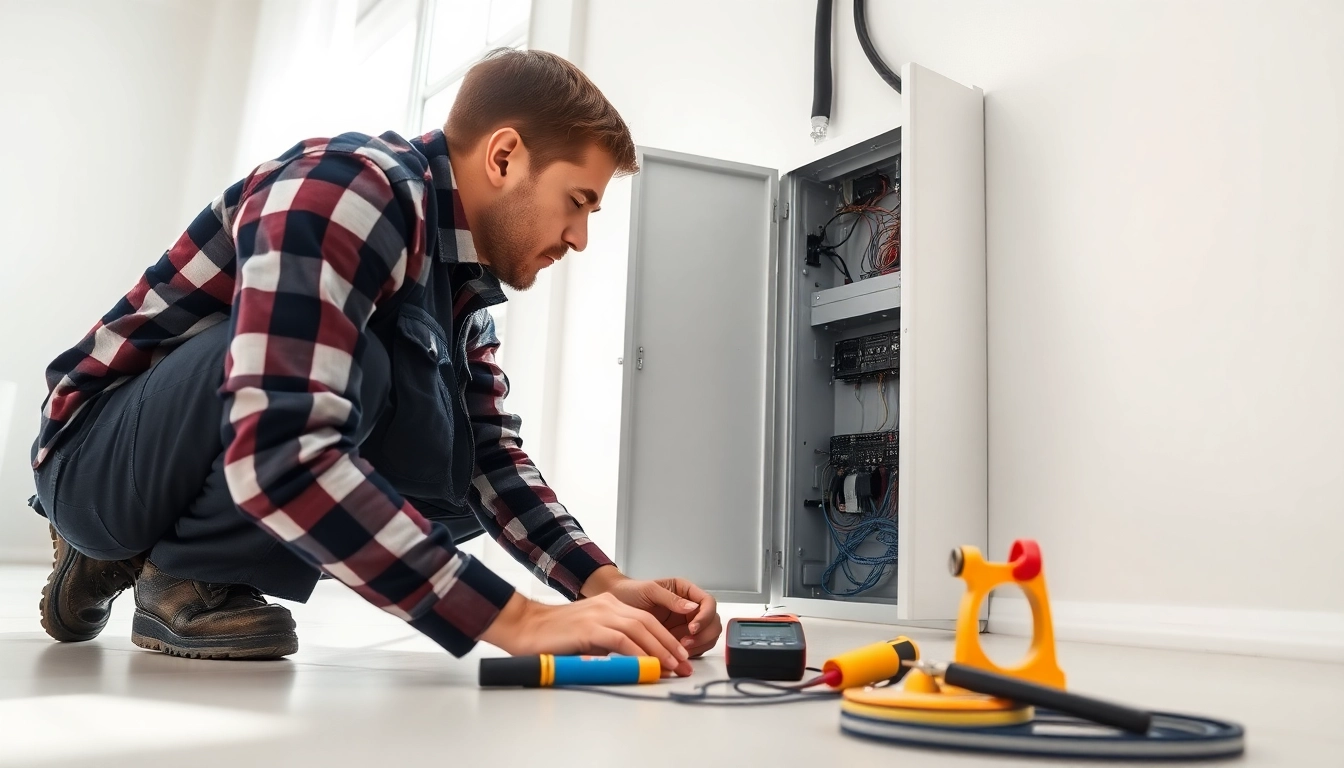Understanding Electrical Panels
What is an Electrical Panel?
An electrical panel, often referred to as a breaker box or service panel, is a crucial component of any home’s electrical system. It serves as the main distribution point for electricity, allowing current to flow to different circuits in your home. Typically, these panels house circuit breakers that provide overcurrent protection and allow you to control the power supply to various areas and devices throughout your property. It’s vital to understand the role of your electrical panel, as it significantly impacts the safety and efficiency of your electrical system.
Components of an Electrical Panel
Understanding the components of an electrical panel can help you identify when it may need upgrading or repair. Key elements include:
- Main Breaker: This serves as the primary switch that controls power to all circuits within the home.
- Circuit Breakers: These devices protect wiring from overloads by interrupting power when current exceeds a safe level.
- Bus Bars: Conductors that distribute electricity to circuit breakers.
- Neutral Bar: This is where all the neutral wires from the circuits are connected and grounded.
- Ground Bar: This connects the ground wires, ensuring electrical safety by preventing shock.
How Electrical Panels Work
The operation of an electrical panel is relatively straightforward yet critical for maintaining electrical safety. Electricity from the utility company enters the panel through a service entrance and connects to the main breaker. From there, it is distributed to various circuits via circuit breakers. Each breaker controls the flow of electricity to individual circuits, which may power specific areas or devices in your home. When a circuit experiences an overload or short circuit, the breaker automatically trips, shutting off the power and preventing potential hazards.
Signs It’s Time for an Upgrade
Age and Electrical Panels
One of the most significant indicators that you need to consider an upgrade for your electrical panel is its age. Typically, electrical panels have a lifespan of 20 to 30 years. If your panel is approaching or has surpassed this age, it may not be equipped to handle the modern electrical demands of today’s households. Newer appliances and devices often draw more power than older panels can accommodate safely.
Common Warning Signs
Besides age, there are other telltale signs that may indicate the need for an upgrade. Look out for:
- Frequent Tripping: If your circuit breakers are tripping regularly, it could signal that the panel is overloaded and needs replacement.
- Flickering Lights: Lights that flicker or dim when you use certain appliances can indicate wiring issues or an inadequate panel.
- Burning Smells: If you notice a burning smell near the panel or in circuits, it’s a warning sign of electrical faults and requires immediate attention.
- Old Technology: If your panel is equipped with fuses rather than breakers, it may be time to modernize your electrical system.
Evaluating Your Electrical Needs
As your household grows, so do your electricity needs. Consider the number of devices you use daily. Do you regularly experience issues with using multiple appliances at once? A detailed evaluation of your electrical consumption can help determine if your panel is equipped to handle your lifestyle. Engaging with an electrician can provide insights into your system’s capacity and whether it meets your current demands.
Benefits of Upgrading Your Electrical Panel
Improved Safety Features
One of the most compelling reasons to upgrade your electrical panel is enhanced safety. Modern panels are designed with advanced features to prevent electrical hazards, protecting your home and family. Breakers with integrated GFCI (Ground Fault Circuit Interrupters) help prevent shocks by automatically shutting off power if a fault is detected. Upgrading also often means improved wiring and grounding systems, which further mitigate risks.
Enhanced Energy Efficiency
Newer panels can improve energy efficiency throughout your home. By upgrading your electrical system, you can take advantage of energy-efficient appliances and smart devices that require proper electrical support to function optimally. Enhanced efficiency not only helps lower your energy bills but also contributes to a reduced carbon footprint.
Increased Home Value
Investing in an electrical panel upgrade can significantly increase the value of your home. Potential buyers often look at the status of the electrical system when assessing a property’s worth. An updated panel that offers modern safety features and capacity for advanced electrical demands can make your home much more appealing on the market.
Choosing the Right Electrical Panel for Your Clearwater Home
Types of Electrical Panels
When considering an upgrade, it’s essential to understand the various types of electrical panels available:
- Main Service Panel: The central unit where all electrical circuits originate, typically rated between 100 and 200 amps.
- Subpanels: Smaller panels that distribute electricity in specific areas of the home, useful for large properties.
- Smart Panels: These panels include smart technology that allows monitoring and control through mobile apps.
Choosing a Qualified Electrician
Selecting the right electrician is critical to ensuring a successful panel upgrade. Look for certified professionals with good reviews and experience. It’s advisable to obtain multiple quotes and references from past work to assess the quality of service. A qualified electrician will not only install your panel but also help advise on the best type and amperage based on your specific needs.
Cost Considerations
The cost of upgrading your electrical panel can vary widely, influenced by factors such as the size of the panel, the complexity of the installation, and labor costs in your area. On average, homeowners can expect to spend between $1,500 and $3,000 for a complete panel upgrade. However, investing in a well-functioning electrical panel can save you from potential hazards and costly repairs down the line.
Conclusion: Making the Right Choice
Assessing Your Current Electrical System
Before deciding on an upgrade, thoroughly assess your current electrical system. Look for warning signs, and contemplate your household’s energy demands. Consulting with a licensed electrician can provide a comprehensive evaluation of your system, helping you understand if an upgrade is necessary and what options are available to you.
Next Steps After Deciding to Upgrade
Once you’ve established that an upgrade is needed, decide on the type of panel that will best suit your needs. Schedule consultations with contractors to understand the scope of work involved and prepare for the upgrade process. Be sure to inquire about warranties and ongoing maintenance after installation to ensure the longevity of your new panel.
Finding Trusted Electrical Panel Services in Clearwater
When searching for Electrical Panel Clearwater services, consider reaching out to local providers with solid reputations. Online reviews, referrals from neighbors, and accolades from industry organizations can help guide your choice. It’s beneficial to select a reputable company that specializes in electrical panel upgrades to ensure quality service.



